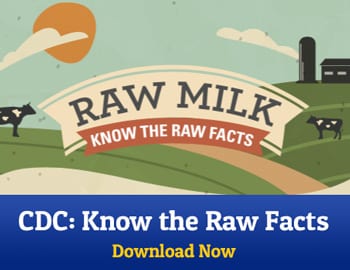 The Texas Association of Dairymen agrees with the Centers for Disease Control and Prevention (CDC) that consuming raw milk is a serious health risk.
The Texas Association of Dairymen agrees with the Centers for Disease Control and Prevention (CDC) that consuming raw milk is a serious health risk.
Pasteurization, the process of heating milk to at least 161 degrees for at least 15 seconds and then cooling it rapidly to kill any disease-causing bacteria, is necessary for dairy food safety. Pasteurization is the only way to ensure milk products do not contain harmful bacteria.
Raw milk can be harmful, according to the latest CDC study:
- 81 outbreaks of illness due to consumption of raw milk or raw milk products were reported to the CDC from 2007-2012, resulting in 979 illnesses and 73 hospitalizations.
- 81% of outbreaks were reported in states where the sale of raw milk is legal.
- Raw milk that caused the outbreaks came directly from a dairy farm 71% of the time.
- Children are at the highest risk of illness from raw milk – 59% of outbreaks involved at least one child younger than age 5.
- The actual number of illnesses associated with raw milk likely is greater because not all cases of food borne illness are recognized and reported.
No scientific evidence finds that drinking raw milk prevents or cures disease or illness:
- Drinking raw milk offers no health benefits that cannot be obtained from drinking pasteurized milk that is free of disease-causing bacteria.
- Pasteurization of milk has never been found to be the cause of chronic diseases, allergies, or developmental or behavioral problems.
- Many studies have shown that pasteurization does not significantly change the nutritional value of milk and dairy products.
Learn more in the CDC’s Frequently Asked Questions about raw milk.
Recent News:
State finds Listeria in raw milk — warns consumers, shuts down dairy operations
Food Safety News, Jan. 22, 2020
Texas dairies ask the Legislature to help keep milk safe
Texas Tribune, June 5, 2018
Texas raw milk Brucella contamination hits 7 states
Food Safety News, Sept. 15, 2017


